When Michelle Reininger went to bed on
June 15, she wasn’t worried about the weather. The last time she checked, the
forecast had called for scattered showers. But in the middle of the night, an
emergency alert blared on her phone: a severe thunderstorm warning. Winds were
expected to reach 80 mph. People should take cover in their homes. “I thought:
Is this a joke?” she recalled.
اضافة اعلان
Ten minutes later, she lost power as
the storm tore through.
By 5 a.m., the worst had passed.
Reininger dressed quickly in the dark. She needed to go check on her charges:
the more than 300 residents of Chimp Haven, the chimpanzee sanctuary nearby,
where she served as the colony director.
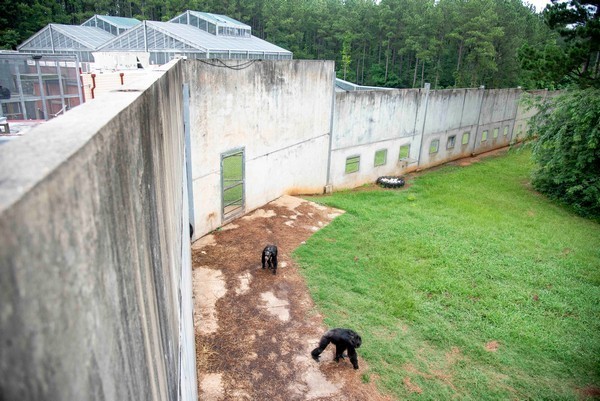 Two chimpanzees at Chimp Haven during an extreme weather drill, in Keithville, La., June 13, 2023. In response to increasing extreme weather incidents, Chimp Haven, a retirement home for research chimpanzees, is running practice drills to teach the chimps to take shelter inside, quickly, when employees sound the alarm.
Two chimpanzees at Chimp Haven during an extreme weather drill, in Keithville, La., June 13, 2023. In response to increasing extreme weather incidents, Chimp Haven, a retirement home for research chimpanzees, is running practice drills to teach the chimps to take shelter inside, quickly, when employees sound the alarm.
As soon as she left her home, the
storm’s toll became clear to her. “Everywhere I went, there was a tree across
the road or power lines down,” Reininger said. She and her colleagues, who were
also making their way to work, soon discovered that a tree was blocking the
main road to the sanctuary.
The group gathered at a convenience
store. As they formulated a plan, Reininger received a text message from the
maintenance supervisor, who had found an alternate route into Chimp Haven.
Trees were down not only on roads, the supervisor said, but a large pine tree
had fallen in one of the chimpanzee habitats. The upper branches were resting
atop the 18-foot wall surrounding the enclosure, creating a ramp that the
chimps could use to escape.
For their own safety, and the safety of
others, the chimpanzees needed to be secured inside immediately. “It had to be
done now,” Reininger said. “There was no time.”
Sounding the Alarm
Chimp Haven is a retirement home for
research chimpanzees, including many owned or supported by the National
Institutes of Health. Before arriving in Keithville, many were used in research
on HIV or hepatitis; others were involved in studies that focused on cognition
or behavior. The sanctuary, which sits on 200 forested acres, aims to provide
the chimps with a tranquil place to live out their days.
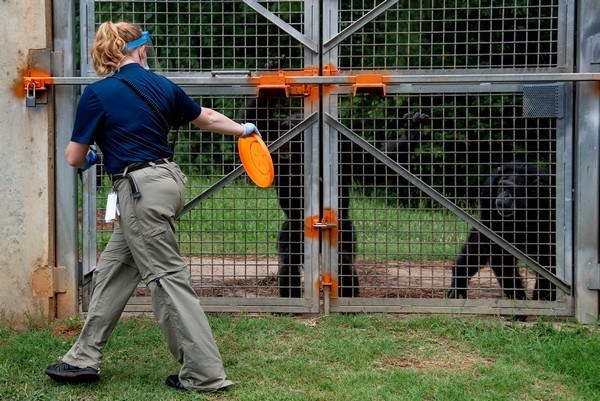 Clara Loesche uses an orange flying disc as a signal to go inside for Sheena, a deaf chimpanzee, during an extreme weather warning drill at Chimp Haven, in Keithville, La., June 13, 2023. In response to increasing extreme weather incidents, Chimp Haven, a retirement home for research chimpanzees, is running practice drills to teach the chimps to take shelter inside, quickly, when employees sound the alarm.
Clara Loesche uses an orange flying disc as a signal to go inside for Sheena, a deaf chimpanzee, during an extreme weather warning drill at Chimp Haven, in Keithville, La., June 13, 2023. In response to increasing extreme weather incidents, Chimp Haven, a retirement home for research chimpanzees, is running practice drills to teach the chimps to take shelter inside, quickly, when employees sound the alarm.
But extreme weather poses an increasing
threat to that peace. “It’s been so weird the last few years,” Reininger said.
“The weather just — it’ll come at you.”
In recent years, the area has been hit
by torrential rains and hurricane-force winds. Tornadoes have spun through with
disconcerting frequency; in December, two people died after one touched down in
Keithville. The danger is expected to grow as climate change supercharges
storms, making hurricanes more intense and heavy downpours more frequent.
Droughts, floods, wildfires, and heat waves are increasing threats.
So, Chimp Haven is now running
extreme-weather practice drills to teach the chimps to take shelter inside,
quickly, when employees sound the alarm. Being able to recall the chimps on
command will help the sanctuary to secure them inside before a storm hits,
keeping them safe — and keeping them from escaping, if new opportunities
suddenly appear.
During a recent winter storm, for
instance, the moats that serve as natural barriers began to freeze. “We could
have an escape situation if chimps walked over,” said Rana Smith, president and
CEO of Chimp Haven. “Or the ice breaks and they fall into the water, which
would be an unfortunate situation.”
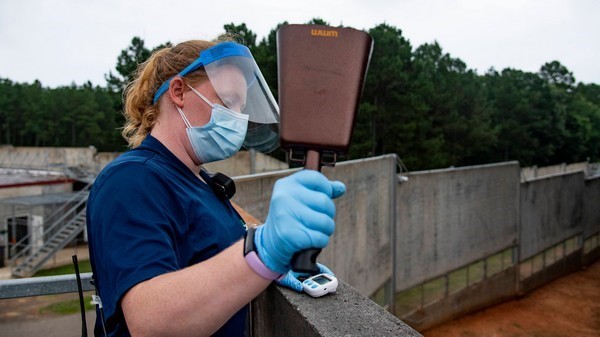 Clara Loesche rings a bell during an extreme weather warning drill at Chimp Haven, in Keithville, La., June 13, 2023. In response to increasing extreme weather incidents, Chimp Haven, a retirement home for research chimpanzees, is running practice drills to teach the chimps to take shelter inside, quickly, when employees sound the alarm.
Clara Loesche rings a bell during an extreme weather warning drill at Chimp Haven, in Keithville, La., June 13, 2023. In response to increasing extreme weather incidents, Chimp Haven, a retirement home for research chimpanzees, is running practice drills to teach the chimps to take shelter inside, quickly, when employees sound the alarm.
The sanctuary has 30 social groups each
living in its own designated space, and some emergencies might require only
some groups to be secured indoors. So Chimp Haven has assigned a unique
auditory cue to each group being trained. “Which has led to us searching far
and wide on Amazon for a lot of different types of sounds,” said Jordan
Garbarino, the training program supervisor. A ringing cowbell means that Flora’s
group needs to hustle inside, for example, while a blaring bicycle alarm means
the chimps in Daisy’s group should take shelter.
Trainers begin by desensitizing the
chimps to the sound, doling out bananas, Cheerios, or other treats as it plays.
Then, they move the snacks inside. Chimps who come indoors when they hear the
alarm will find “forage” — a snack mix containing popcorn, peanuts and
sunflower seeds — and receive another treat, such as a Popsicle. Once the
animals are reliably coming inside on cue, employees begin closing and locking
the doors. Then they train the chimps to complete the process faster and
faster.
Five groups, which include a total of
65 chimps, are in different stages of training. The 19 members of Flora’s group
were the first to become fully trained, but they still regularly practice the
recall to keep their skills sharp.
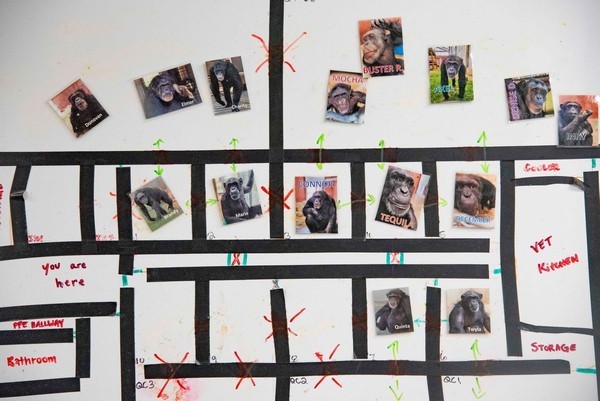 A chart of chimpanzee room assignments at Chimp Haven in Keithville, La., June 13, 2023. In response to increasing extreme weather incidents.
A chart of chimpanzee room assignments at Chimp Haven in Keithville, La., June 13, 2023. In response to increasing extreme weather incidents.
During a routine drill a few days
before the June thunderstorm, the chimps showed what they could do. Clara
Loesche, an animal care specialist, climbed onto the roof of a low-slung,
concrete building. From this rooftop perch, the 5-acre, tree-filled habitat
that Flora’s group called home looked nearly empty.
Then, Loesche began ringing the
cowbell. Suddenly, chimps emerged from the woods, gamboling across the grassy
lawn and clambering into the adjoining buildings. Loesche descended the stairs,
looked at her watch, and brought a walkie-talkie to her mouth. “Ten seconds
until doors close,” she said. Precisely 10 seconds later, she slid a big metal
bolt shut.
“That’s wonderful!” she exclaimed, in a
singsong voice. Less than two minutes had passed since she had begun ringing
the bell, and 18 of the 19 chimps were secured. The only holdout was the
eponymous Flora, a timid 41-year-old who had been slow to take to the training.
She had been performing well in recent months, Loesche said, but today she had
dawdled by the door, hesitant to step inside.
On that particular afternoon, they
decided to let Flora linger outside. But had there been a real threat, they
might have coaxed her in by offering a safe, private room or even better
treats. “In an actual emergency,” Garbarino said, “we would go to great lengths
to get them inside.”
A Scare, Then Relief
Three days later, the thunderstorm, and
the damage it left behind, became that emergency. With news of the fallen tree,
a potential escape route for the chimps, several employees set off for the
sanctuary, climbing through the tree that was blocking the road.
Chimp Haven had been hit hard. The
forested walkway at the entrance was damaged. Trees had been snapped in half,
and branches littered the ground. The power was out and would remain so for six
sweltering days.
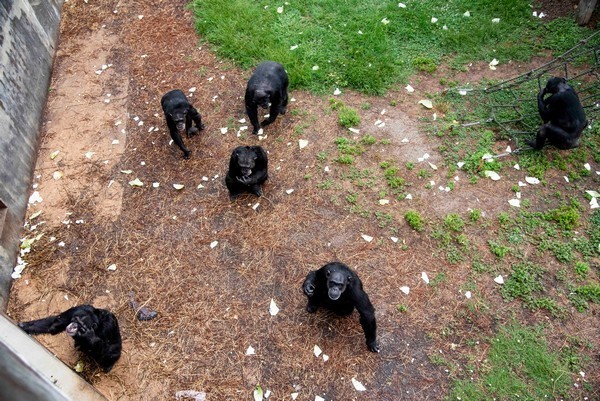 Chimpanzees enjoy a snack at Chimp Haven in Keithville, La., June 13, 2023. In response to increasing extreme weather incidents.
Chimpanzees enjoy a snack at Chimp Haven in Keithville, La., June 13, 2023. In response to increasing extreme weather incidents.
Employees rushed to the habitat, unsure
whether the 15 chimps who lived there, all members of Daisy’s group, were still
safely inside after “not knowing where they had been all night,” Loesche said,
“if they were lost, if they had been struck by lightning.” Staff members had
dart guns at the ready just in case they spotted a chimpanzee that had escaped.
They did a quick head count. After a
brief scare — at first, they had trouble locating Betsy — they were relieved to
find all animals accounted for.
“And then came the next round of
adrenaline,” Loesche said.
The tree was an ongoing hazard, and the
chimps needed to be secured inside until it was removed. It was exactly the
kind of situation that the recall training had been designed for, but it would
not be a textbook recall.
Daisy’s group was still acclimating to
the wailing alarm that served as their auditory cue. Trainers had not yet laid
out the full recall procedure for the chimps or run them through a complete
drill. Today was not the day to try. “We didn’t want to waste time making the
noise when that isn’t as established yet,” Loesche said. “And it was such an
unknown situation.”
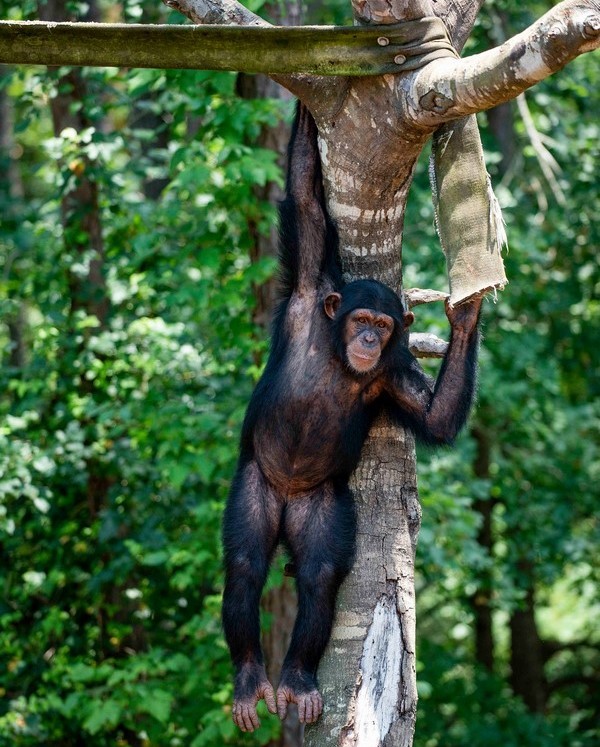 A chimpanzee named Carlee hangs from a tree at Chimp Haven in Keithville, La., June 13, 2023. In response to increasing extreme weather incidents.
A chimpanzee named Carlee hangs from a tree at Chimp Haven in Keithville, La., June 13, 2023. In response to increasing extreme weather incidents.
Fortunately, most of the chimps had
gathered near the building, so staff members decided to lure them in with food.
They began scattering forage and chimp chow, which drew some chimps inside. One
caregiver dashed off to grab frozen grapes and strawberries, which attracted
more animals. Popsicles won over the remaining stragglers.
Except for two: Destiny and Jeff
Lebowski. Both chimps were known for being reluctant to come inside and had been
utterly unmoved by the treats. So, the team switched tactics.
The buildings and enclosures at Chimp
Haven are connected by a network of elevated mesh-enclosed passageways, or
chutes, which are used to move chimps to different locations. Most chimps love
using the chutes, which are typically left closed and locked. “When you give
them access to an area they’re typically denied access to, that becomes very
exciting to them,” Reininger said.
Perhaps Destiny and Jeff Lebowski would
be willing to scamper into a chute? They showed little interest in the first
two that employees opened for them. But the third chute, which led to a yard
inhabited by another chimp group, proved irresistible.
“They went in immediately,” Loesche
said. Employees closed the chute door, temporarily locking them inside.
Finally, all 15 chimps had been secured.
Read more Odd and Bizarre
Jordan News







